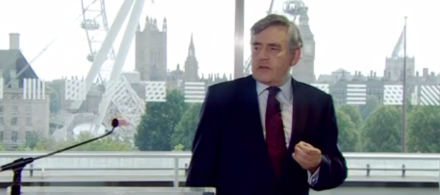
Gordon Brown today delivered an impassioned appeal for Britain to stay in the EU in order to protect jobs, workers’ rights and the environment.
The former prime minister draws on his history as a “pro-European chancellor” to make the case to Remain in an era of globalisation and mounting threats to international security and stability.
Brown also issues a strong warning that a vote for Brexit would mean missing out on the “hundreds of thousands” of jobs which EU membership would create in this country over the next decade.
He was speaking at the University of Warwick where he argued the referendum “about the people of Britain and the kind of country we want to live in, now and in the future”.
Brown made his latest intervention for the Labour In campaign as the Tories’ internal battles over the EU gain increasing attention – but also as Vote Leave, the official Brexit campaign group, goes to war with ITV over its plan for a televised debate between David Cameron and Nigel Farage.
Today Brown said: “When we look at the challenging demands of a global economy and an increasingly insecure and unstable world, the case for British engagement in Europe is even stronger than it was when we first joined the European Economic Community in the 1970s.
“Since then, we have entered a new world that is shaped by globalisation and defined by our interdependence. In this world, the real challenge for our nation – and indeed for every nation – is to balance the autonomy we desire with the co-operation we need.”
Brown also looked back on his on time as Chancellor – when he blocked Tony Blair from taking Britain into the euro single currency – to show how he worked within Europe without signing up to its entire agenda.
“As a pro-European chancellor who nonetheless recommended against entry into the Euro, I will always put Britain’s national interest first.
“I opposed the Euro when co-operation was wrong for Britain but I support co-operation in a range of areas including the economy, workers’ rights and the environment where it is right for Britain.
“While I recommended against entry into the Euro, I have always favoured opening up the European single market.
“Thousands of British people are going to work today in the 200,000 individual British companies trading with Europe. 10,000 European-owned businesses employ us, British workers, across our country. The most recent reputable study by Professor Iain Begg has suggested more than three million jobs in Britain are now linked to Europe.
“And as the single market expands into digital, financial services and energy – areas in which Britain is a world leader – it could become the biggest job creator of the next decade, creating up to 500,000 new jobs.
“And we need Britain to remain part of the EU to benefit from a 15 per cent share – £45billion plus – of the £320billion European infrastructure fund, particularly to help rebuild our hard-hit steel communities.
“While Parliament continues to determine our own social security policies, we help workers secure basic rights by setting minimum standards across the 28 EU member countries – preventing a self-defeating race to the bottom in which the good paying companies and countries are undercut by the bad and the bad by the worst.
“Inside the European Union, Britain has the power to decide our energy balance between nuclear, coal, oil and renewables. However, an energy and environmental union not only prevents free-riders from polluting our air but also integrates our massive yet intermittent wind and wave power into the widest possible energy pool – preventing the waste of power.
“It is clear that the challenges ahead for Britain – from creating jobs and raising living standards to combatting pollution and ensuring our defence and security – can only be addressed by cross-border co-operation and co-ordination with our nearest neighbours.”




More from LabourList
‘Tackling poverty should be the legacy of Keir Starmer’s government’
‘The High Court judgment brings more uncertainty for the trans community’
‘There are good and bad businesses. Labour needs to be able to explain the difference’